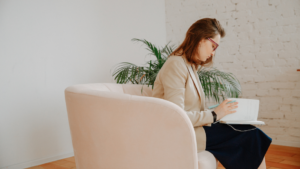Your office is likely one of the spaces you spend the most time in. In other words, not only does it set the tone for client sessions, but it also impacts your own mental health.
If you’re thinking about making some changes to your space, here are 12 real-life tips from other professionals on how to spruce it up!
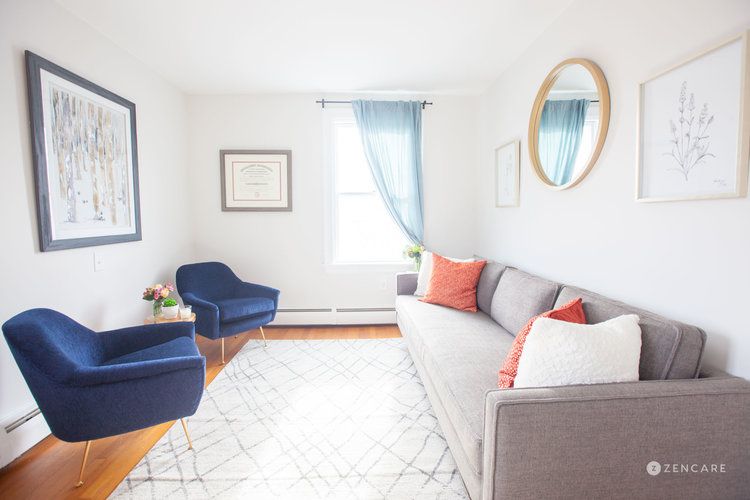
1. Introduce warm elements, like nature sketches, to avoid “clinical” feels
For Marianna Kessimian, MD, designing her office was intensely personal and rewarding.
“I walked into the store knowing that the design aesthetic I wanted for my office was mid-century modern: clean, sophisticated and functional. But I was worried that it could be experienced as somewhat overly formal and cold.
In order to add warmth, I added texture, prints, and color. For the wall art, I was inspired by mindfulness practice and the psychological benefit of connecting with nature’s simple yet extraordinary gifts.”
And those floral prints? They’re from the artist Christine Tong. “I found them on one of my discovery missions to TJ Maxx and Home Goods!”

2. Keep it clean and streamlined for peaceful vibes
For Dr. Amy Funkeinstein, decluttering was the key to a happy office. “I wanted my aesthetic to be inviting, uncluttered, clean, and streamlined – so that the focus is on feeling comfortable and the work that goes on within the walls, rather than being distracted by items in the space.”
3. Replicate what you love online for inspiration
“I am not terribly good at interior decorating, but given that [therapy] is my business, I felt strongly that I wanted it to have a cohesive and calming feel,” says Dr. Funkenstein. “I looked at a lot of websites, such as West Elm and CB2, both of which have mid-century modern styles, and I tried as much as I could to copy some of the rooms I liked. I invested in the couch (from West Elm) – and the rest is IKEA, clearance aisles at Home Goods, and Amazon!”

4. Embrace and complement natural lighting
“When I opened my practice five years ago, it was truly important to me that my patients feel a sense of peaceful strength as they walk through the door,” says Dr. Wendy O’Connor, PsyD.
To ensure that, she went light: As in, natural light. “I first made sure to select an office with fantastic natural light,” she says. She then decorated with pastel colors, including beige and blue, to complete the calming aesthetic.
5. Frame your favorite quote!
“I scoured the internet to find the right decor, and when I contemplated which inspirational quotes to have on my walls, I wanted to incorporate language that demonstrates empowerment and determination,” says Dr. O’Connor.
Erica Albert, LICSW, is of a similar mind. “The quotes I use are not just phrases I want my clients to live by, but ones I want to live by as well.”
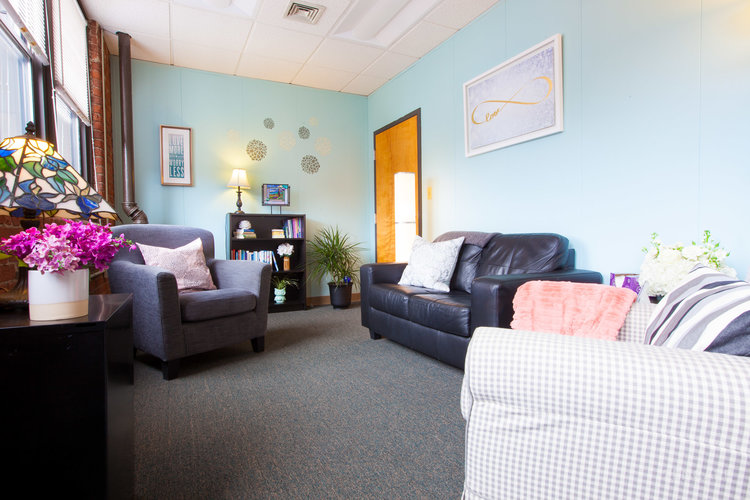
6. Be intentional with your props
Gebhart, for example, uses lavender essential oils for a relaxing smell. She incorporates pillows and blankets for more warmth and connection. “I’m only drawn to accessories that I feel genuinely connected to, hence all the owl and elephant accents – I’m obsessed with them!” she says.
Catherine Horton, LICSW, also had to be selective with her accessories. “I love artwork and plants,” she says, “but I had to pare these down or risk overstimulating my clients. I had dreams of having toys, art supplies, and a sand tray, but this would mean giving up space for family therapy; I’m passionate about old, distressed furniture, but couldn’t find any pieces that would offer my clients a comfortable seat.”

7. Budget for the more costly elements first
Horton was starting from scratch for her office – so she started with the sofa. Why? “It is both the most central piece – and the most costly!”
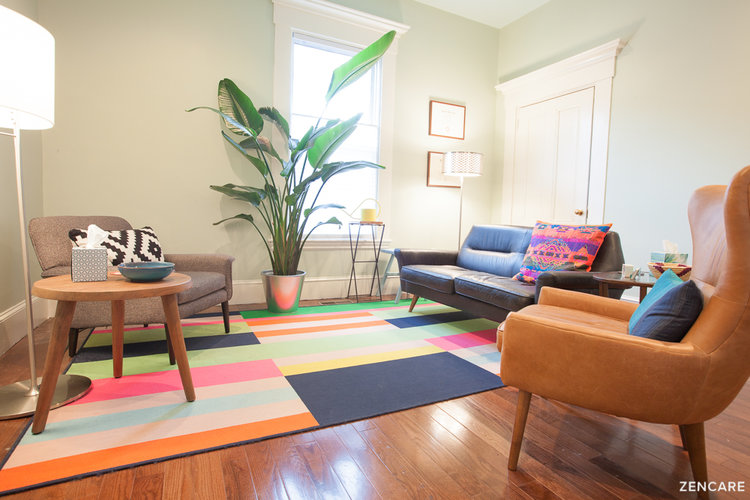
8. Pick a plant you really love (and that’s easy to maintain)
Lauren Becker, PsyD, chose a big plant because she wanted to experience nature and life in her office – for both herself, and her clients. “My office is in the heart of a city,” she says, “and so I want it to be a calm space that patients find refuge in during a busy day.”
The plant invites comment, too: “I also love how this plants grows and changes. My patients regularly comment on how it transforms over time. It loves the sun and is easy to maintain – I don’t do much other than water it once a week and place it next to a window!”
One large plant makes a statement without interfering. “The space feels alive and full of optimism, which is what I hope my patients feel, too.”
9. Make it personal with your own artwork
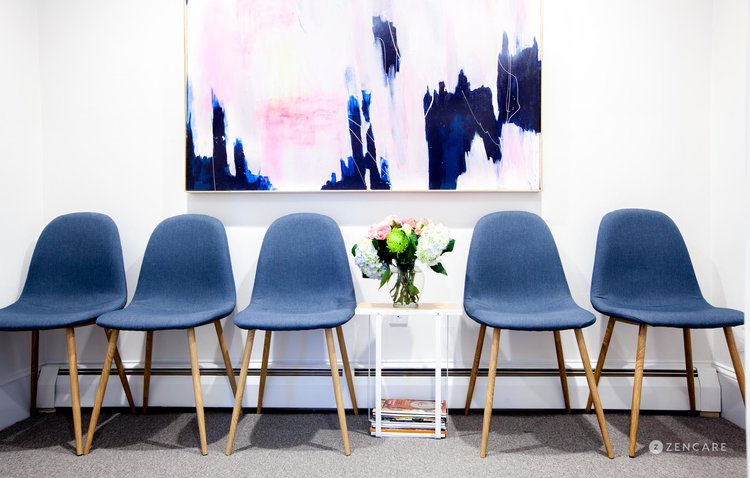
For Dr. Stephanie Hartselle, using her own art was second nature. “I draw my inspiration from my mother, who is an artist and taught art all of my life in the public schools. I still love to paint, embroider, felt, and knit.”
To get creative, she goes to Blick for canvas and acrylic paint. “I don’t do anything fancy like stretch my own canvas, and usually use the house paints instead of the expensive acrylics. I do like acrylic because it’s quick to dry and I can cover mistakes. You can also add depth to paintings by layering on the paint.”
Why did she opt for her own paintings? “Convenience and practicality! I can create something that fits the aesthetic quickly, and is relaxing.
We have other artists’ work in the offices, and I’m always looking for more ways to make the space a calm and interesting place to be. I also have a large painting by my mother in the entry and various prints by local and national artists in the common areas.”
The overall result is a design sense that’s modern and bright – even in the darkest of winter, she says, “I like that people might feel uplifted by the space.”
10. Combine functionality and design
Melissa DaSilva, LICSW, makes different items in her office functional. “I have larger pieces on the wall to help with the acoustics,” she says. The Mandala in the picture below? It’s actually a tapestry she stretched on a canvas. “I also have it padded with sound absorbing foam, since our walls can be a bit thin.”
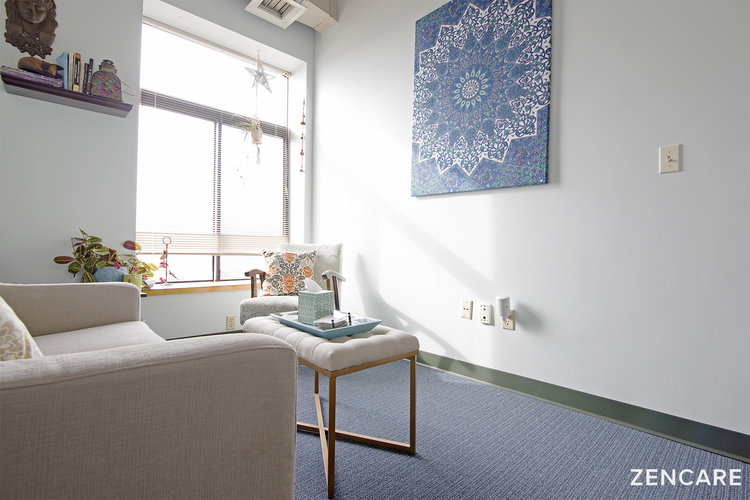
11. Embrace the vintage look with secondhand items
Whether you’re on a budget, or – like DaSilva – have a passion for office decor, secondhand is a great way to go. “My offices are typically furnished and decorated with secondhand items. I like to create art out of items people don’t have a use for.”
Her personal signature? “I call my style “Up-cycle Chic”!
12. At the end of the day, make it your space
Gilbert summarizes it perfectly: “If I don’t honor this space for what it provides – both energetically and emotionally – I wouldn’t expect my clients to, either.”
Reduce clinical administrative tasks and transform more lives with Owl Practice. Owl Practice provides all the tools you need to make your practice successful. Join the thousands of care professionals using Owl to run their practice every day.

